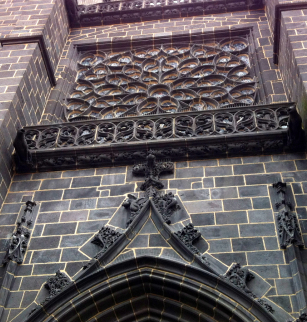Faculté des Lettres et Sciences Humaines - Faculté de Droits et de Sciences Économiques

The Humanities university building and the Law and Economics university building of Clermont-Ferrand, built in the 1960s, both have Architecture Contemporaine Remarquable (remarkable contemporary architecture) status.
HUMANITIES UNIVERSITY BUILDING
The humanities university building on Boulevard Gergovia was built between 1963 and 1966 by the architect Georges Noël (1907-1970), Prix de Rome award winner. An example of rational architecture, the building belongs to the Brutalism trend. Recognisable on the boulevard by the considerable size of the large amphitheatre, the university is built entirely from reinforced concrete. The amphitheatre, standing on V-shaped piers, straddles the entrance path to the university. The teaching spaces are organised in a perpendicular five-storey building. This building, with its totally visible reinforced concrete frame, is also sitting on concrete piers. It was awarded “Architecture Contemporaine Remarquable” (remarkable contemporary architecture) status in 2023.
LAW AND ECONOMICS UNIVERSITY BUILDING
The law and economics university building received the same award, as did the adjoining school for tax studies. The two institutions were inaugurated in 1966. Eugène Beaudoin (1898-1983) was the architect of the law school and Bernard de la Tour d’Auvergne of the tax studies school. Structured into four buildings around a central garden, the two institutions share the space: the northern, eastern and half of the southern section for law; the rest for the tax studies school. The first level is enhanced as a first floor. The floor culminates in a cornice placed on supports, thus creating a simple line of light that highlights the façade. The architects used Volvic stone and aluminium and created large glass surfaces.
The monument La France, by Antoine Bourdelle (1861-1929), bequeathed by the sculptor’s widow, depicts France as Pallas or Athena, holding a spear decorated with olive branches, a shield formed from the tablets of stone, and the serpents of wisdom. Opposite is the statue of the Clermont lawyer, Jean Domat, a friend of Blaise Pascal, by Gustave Gournier (1970).
Additional information
Visible from the street only.
Prices
- Free access.




















